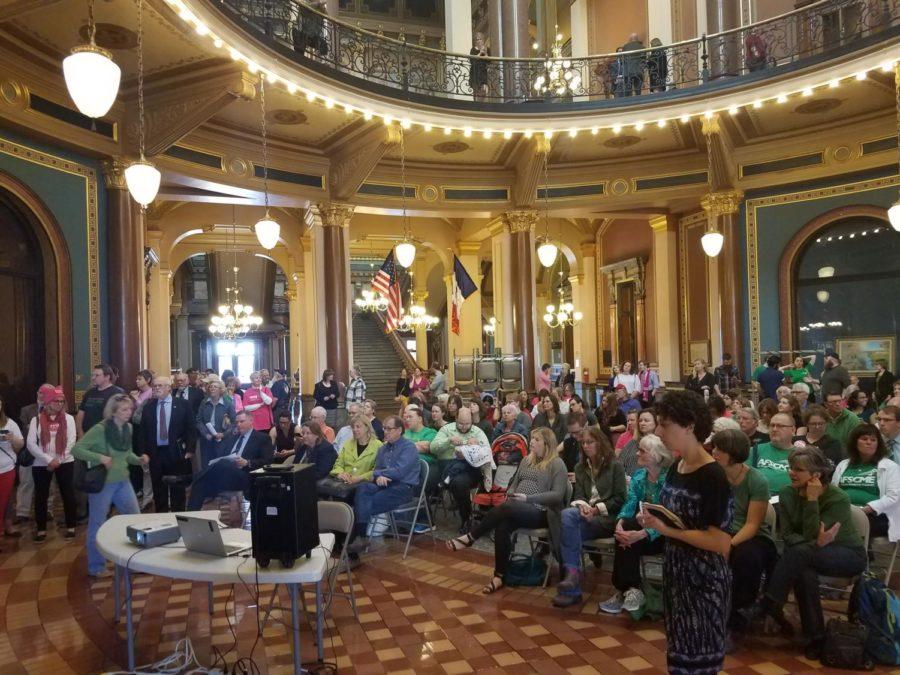Iowans, farmers lobby lawmakers about importance of innovation from Leopold Center
A crowd of people watch a live stream of a public hearing just outside of the Capitol Building’s Supreme Court Chambers, which was a full standing and seating capacity, in Des Moines on Monday.
April 17, 2017
Hundreds of Iowans, many of them farmers, crowded into the State Capitol Building in Des Moines on Monday to lobby in favor of continued funding for the Leopold Center for Sustainable Agriculture at Iowa State University.
According to its website, the Leopold Center was created to identify and develop innovative ways to farm profitably. Its efforts also include research on conserving natural resources as well as reducing negative environmental and social impacts.
An agricultural budget bill recently introduced by the Iowa Legislature would effectively end operations at the Leopold Center and result in a lack of funding for research in fields like sustainable farming, among other research topics.
Iowans from around the state packed the Supreme Court Chambers to ask members of the budget subcommittee to reconsider their proposed plan during a public hearing at the Capitol Building.
“On behalf of the family farmers of the Iowa Farmers Union, I urge you to restore funding to the Leopold Center for Sustainable Agriculture at Iowa State University,” said Aaron Lehman, president of the Iowa Farmers Union and a fifth-generation farmer on his family’s farm in northern Polk County.
“The elimination of the [Leopold Center] would be a devastating blow to the work of family farmers in Iowa to be good stewards of our land and water,” he said.
Lehman said that the Leopold Center “has been great at providing innovations for family-sized farmers to become more sustainable.”
“It’s an organization that really combines research and farmer practicality better than any other,” he said.
Lehman called the budget subcommittee’s plan “shortsighted” and said that Iowa farmers need innovations to continue in the future.
“It’s really distressing,” Lehman said, “and it’ll be a big blow to family farmers.”
Mark Peterson, a family farmer from Stanton, praised the Leopold Center for its wide variety of research that helps Iowa farmers.
“The Leopold Center works in so many areas of agriculture outside of the mainstream,” Peterson said. “From waterways to wineries.”
Peterson said that if funding is cut to the center, innovations in sustainability and agriculture will be “severely crippled.” He also said the plan has left him disappointed in Iowa lawmakers.
“I know they’re diverting [funds] to other agricultural entities, but there’s no reason to drop this one,” he said. “The work of the Leopold Center is nowhere near done.”
Peterson said that investment in the Leopold Center provides good returns for the state of Iowa both financially and in innovation.
Also in attendance at the hearing was Iowa State alumnus Ryan Marquardt, who received a master’s degree in sustainable agriculture in 2008 and is the board president of the Iowa Food Cooperative, which grew out of a feasibility study funded by through the Leopold Center.
“We’ve done $1.8 million in sales over the last nine and a half years almost entirely of Iowa-produced products to our members,” Marquardt said.
Membership in the Iowa Food Cooperative is currently made up of 1,200 Iowa households.
“The Leopold Center has the advantage of having a bipartisan foundation to provide information to farmers to improve their practices and their profitability,” Marquardt said.
Iowa State alumna Jana Linderman is in the process of transitioning control of the operation of her parent’s farm in Linn County to herself. She said that for someone in her situation the Leopold Center is largely beneficial.
“It takes a lot to either purchase a new farm or transition an old farming operation to a new generation and it’s really economically tough for all farmers right now, especially if you’re a new business owner,” she said.
Linderman said that while the Leopold Center is known for conservation research, it also researches market trends and risk assessment, which is helpful for someone in her position.
“For family farmers and especially beginning farmers it’s about increasing your profit margins,” she said.
“And knowing — even if there’s an economic downturn, a drought or effects on farming from climate change — that my farm is still going to be here next year because I built up both an ecologically and an economically resilient operation that can withstand those impacts, that’s huge. And that’s because of the research the Leopold Center does.”
The Senate and the House are expected to vote sometime this week on the budget plan, which would take effect in July of 2018.







